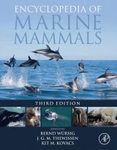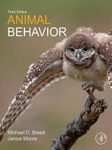By: Maria Cristina Fossi(Editor), Cristina Panti(Editor), Michael H Depledge(Foreword By)
486 pages, colour & b/w illustrations, tables
![Marine Mammal Ecotoxicology Marine Mammal Ecotoxicology]()
Click to have a closer look
About this book
Contents
Customer reviews
Related titles
About this book
Marine Mammal Ecotoxicology: Impacts of Multiple Stressors on Population Health provides tactics on how to develop a comprehensive methodology for the study of existing threats to marine mammals. By presenting a conservation-biology approach and new and emerging technologies, this work helps provide crucial knowledge on the status of marine mammal populations that not only helps readers understand the ecosystem's health, but also instigate mitigation measures. This volume provides information that helps investigators unravel the relationships between exposure to environmental stressors (e.g. climate change, pollutants, marine litter, pathogens and biotoxins) and a range of disease endpoints in marine mammal species.
The application of robust examination procedures and biochemical, immunological, and microbiological techniques, combined with pathological examination and behavioral analysis, has led to the development of health assessment methods at the individual and population levels in wild marine mammals.
Contents
PART 1. Legacy and emerging contaminants in marine mammal populations
1. Organochlorine contaminants and reproductive implication in cetaceans
Paul Jepson, Robin Law
2. Heavy metals exposure in Odontocetes
Gregory Bossart
3. Oil pollution and cetaceans: a particular insight on the Deep-water Horizon oil spill
Teresa Rowles, Gina Ylitalo, Lori Schwacke
4. Legacy contamination in estuarine dolphin species from the South American coast
Salvatore Siciliano and other colleagues
5. Perfluorinated compounds in dolphins
Patricia Fair and colleagues
6. Marine debris interaction with marine mammals
Maria Cristina Fossi, Cristina Panti, Sara Baulch
7. Contamination in hot spot areas: the Mediterranean Sea
Assuncion Borrell, Begona Jimenez, Letizia Marsili
Customer Reviews
By: Maria Cristina Fossi(Editor), Cristina Panti(Editor), Michael H Depledge(Foreword By)
486 pages, colour & b/w illustrations, tables











![Mexico Field Guides: Baja California - Sea of Cortez - Pacific Coast: Marine Mammals [English / Spanish]](http://mediacdn.nhbs.com/jackets/jackets_resizer_medium/13/139516.jpg?height=150&width=96)


![Atlas des Mammifères Sauvages de France, Volume 1: Mammifères Marins [Atlas of Wild Mammals of France, Volume 1: Marine Mammals]](http://mediacdn.nhbs.com/jackets/jackets_resizer_medium/23/233077.jpg?height=150&width=108)


















